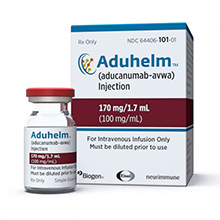Banner physicians at forefront of new treatments
10/04/2021
Banner clinician-researchers continue to be at the forefront of the national effort to offer the latest treatments and therapies to patients facing cognitive disorders like Alzheimer’s disease. Alireza Atri, M.D., Ph.D., director of the Banner Sun Health Research Institute, has been a leading force seeking answers and clarity in the wake of the Food and Drug Administration’s approval of the first drug for Alzheimer’s disease in 18 years.
Biogen’s Aduhelm received accelerated approval from the FDA in June after an external advisory panel – whose recommendations are non-binding - did not recommend the drug for full approval. “There are incredible gaps between the FDA label and what most of us in the field feel need to happen in terms of detailed guidance on using this drug,” Dr. Atri said in an interview with Medscape News.
These gaps prompted Dr. Atri and an independent panel consisting of five other leading international Alzheimer’s experts to develop Appropriate Use Recommendations for the new drug, published in The Journal of Prevention of Alzheimer’s Disease and simultaneously presented at Alzheimer’s Association International Conference in July 2021.
“This is a first-in-class drug – that is far from a cure -- where the vast majority of clinicians have no experience with it and patients and their caregivers are already asking for it,” Dr. Atri added. “There are some really important conversations to be had ― not only about who may qualify to begin with, but also about potential effectiveness and safety.”
Aduhelm trials included people with “early stage” Alzheimer’s disease – those with mild cognitive impairment or mild dementia due to Alzheimer’s – and the presence of amyloid plaques in their brains. That is why the panel recommended that only people with similar profiles should be considered for this treatment. Amyloid is a sticky brain substance that is a defining feature of Alzheimer’s. It can now be reliably detected with a specialized brain PET scan or by testing cerebral spinal fluid.
To maximize potential benefits and minimize risks, the panel recommended that patients considered for treatment should also undergo safety monitoring procedures akin to those in the Aduhelm clinical trials. For example, patients should not have substantial concurrent medical (e.g. active cancer, organ failure) or major psychiatric disorders, not be taking blood thinners, and be monitored for symptoms and periodically undergo MRI scans that would detect blood, fluid buildup, or swelling in the brain, as such side effects were observed in around 20 to 40 percent of clinical trial participants.
The panel also emphasized that before beginning therapy, a patient-centered discussion was necessary to ensure that clear and complete information is provided to the patient and family or care partner, and that patients understand the expectations and requirements; potential benefits and side effects; and uncertainties and alternatives regarding treatment.
“We need to be cautious and very thoughtful about how we proceed and ensure that we have appropriate guardrails. However, we should proceed, and do so with patient well-being and justice in mind. And allow patients to have the autonomy to make informed decisions regarding their life and care when facing this still incurable disease,” said Dr. Atri.


